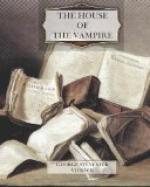“So we are; but friendship bridges the chasm between.”
“How long have you known him?”
“We have been chums ever since our sophomore year.”
“What attracted you in him?”
“It is no simple matter to define exactly one’s likes and dislikes. Even a tiny protoplasmic animal appears to be highly complex under the microscope. How can we hope to analyse, with any degree of certitude, our souls, especially when, under the influence of feeling, we see as through a glass darkly.”
“It is true that personal feeling colours our spectacles and distorts the perspective. Still, we should not shrink from self-analysis. We must learn to see clearly into our own hearts if we would give vitality to our work. Indiscretion is the better part of literature, and it behooves us to hound down each delicate elusive shadow of emotion, and convert it into copy.”
“It is because I am so self-analytical that I realise the complexity of my nature, and am at a loss to define my emotions. Conflicting forces sway us hither and thither without neutralising each other. Physicology isn’t physics. There were many things to attract me to Jack. He was subtler, more sympathetic, more feminine, perhaps, than the rest of my college-mates.”
“That I have noticed. In fact, his lashes are those of a girl. You still care for him very much?”
“It isn’t a matter of caring. We are two beings that live one life.”
“A sort of psychic Siamese twins?”
“Almost. Why, the matter is very simple. Our hearts root in the same soil; the same books have nourished us, the same great winds have shaken our being, and the same sunshine called forth the beautiful blossom of friendship.”
“He struck me, if you will pardon my saying so, as a rather commonplace companion.”
“There is in him a hidden sweetness, and a depth of feeling which only intimate contact reveals. He is now taking his post-graduate course at Harvard, and for well-nigh two months we have not met; yet so many invisible threads of common experience unite us that we could meet after years and still be near each other.”
“You are very young,” Reginald replied.
“What do you mean?”
“Ah—never mind.”
“So you do not believe that two hearts may ever beat as one?”
“No, that is an auditory delusion. Not even two clocks beat in unison. There is always a discrepancy, infinitesimal, perhaps, but a discrepancy nevertheless.”
A sharp ring of the bell interrupted the conversation. A moment later a curly head peeped through the door.
“Hello, Ernest! How are you, old man?” the intruder cried, with a laugh in his voice. Then, noticing Clarke, he shook hands with the great man unceremoniously, with the nonchalance of the healthy young animal bred in the atmosphere of an American college.
His touch seemed to thrill Clarke, who breathed heavily and then stepped to the window, as if to conceal the flush of vitality on his cheek.




